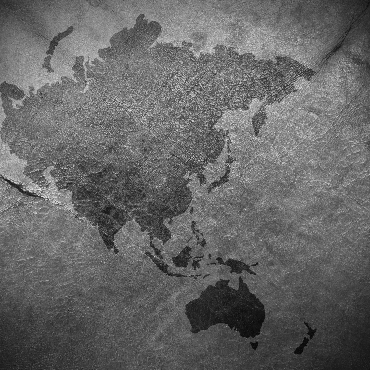SINGAPORE DEFIES NEIGHBORS, SANCTIONS MOSCOW...
In the wake of Russia's invasion of Ukraine, Singapore announced unilateral sanctions targeting Russian banks and strategic exports. Singapore – the smallest member state by landmass in the Association of Southeast Asian Nations (ASEAN) – was the only ASEAN member to join the United States and other Western governments in punishing Moscow, by virtue of its lack of significant economic and defense ties to Moscow. Singapore's Foreign Ministry justified the decision by virtue of its "small state" identity: "We cannot accept the Russian government's violation of the sovereignty and territorial integrity of another sovereign state... this is not a theoretical principle, but a dangerous precedent."
That same small-state identity, though, is presenting challenges for Lawrence Wong, Singapore's Finance Minister and the heir-apparent to be prime minister. Singapore has famously courted Washington and Beijing simultaneously for decades, and enjoys robust economic and diplomatic relations with both capitals. Even so, Wong has publicly warned that the return of great power competition "may erode the rules-based multilateral system that has been so crucial to Singapore’s success" – a system upheld by the United States and challenged by China. (Singapore Ministry of Foreign Affairs, March 5, 2022; Financial Times, May 2, 2022)
...WHILE JAPANESE PM SWINGS THROUGH SE ASIA TO BOLSTER UNITY
Unlike Singapore, many ASEAN members have defense equities with Moscow and are therefore hesitant to join the sanctions campaign against it. Keenly aware of this divide, Japanese Prime Minister Fumio Kishida made a sweep through Southeast Asia in early May to ink economic agreements and defense deals with Vietnam, Indonesia, and Thailand. In Thailand, Kishida announced a new defense deal with Thai Prime Minister Prayuth Chan-ocha aimed at increasing hardware and technology transfers from Tokyo to Bangkok. Kishida also used the trip to shore up a common diplomatic line with Southeast Asian nations in support of sovereignty and territorial integrity. (Reuters, May 2, 2022)
BEIJING EYES THE SOUTH PACIFIC
In late April, China and the Solomon Islands hastily signed a security pact after anonymous officials leaked news of the impending deal to the media. While the full terms of the compact are not known, it appears that China has secured port access for the People's Liberation Army Navy (PLAN) in the Solomon Islands. This development garnered strident statements from Washington and Canberra, and resulted in an emergency visit from White House Indo-Pacific Coordinator Kurt Campbell and Assistant Secretary of State for East Asia and Pacific Affairs Dan Kritenbrink. Both Beijing and Honiara claim the deal does not allow the PLAN to build a military base on the Solomon Islands. However, it does allow the presence of Chinese police to protect Chinese-funded infrastructure and to assist in maintaining order on the island. The United States and others worry these terms could permit China to use the Solomons for "logistical replenishment" in the event of a conflict, giving it a major strategic advantage over other stakeholders in the region, such as the U.S.
Neighboring countries such as Fiji, New Zealand, Papua New Guinea, and Japan expressed deep concerns over this new security threat in the South Pacific, but Solomon Islands prime minister Manasseh Sogavare has downplayed these concerns. The security pact has larger implications for nations such as Australia, which could face the prospect of a Chinese military presence just 1,200 miles from its northeastern coast. (Associated Press, April 4, 2022, Reuters, April 21, 2022)
AUKUS EXPANDS
AUKUS, the newly created security alliance between Australia, the UK, and the U.S., is expanding beyond its project to provide Canberra with nuclear-powered submarines. The member states recently announced that the alliance will jointly develop hypersonic missiles, which are at least five times faster than the speed of sound and evade current missile defenses. The decision comes in the wake of China's widely publicized hypersonic missile test in October, and against the backdrop of rising regional worries as China continues to expand its military presence in the Indo-Pacific. (Associated Press, April 6, 2022)
HOW DELHI IS PLANNING TO DECOUPLE FROM MOSCOW
As the war in Ukraine continues, India is aiming to boost military equipment production and become a defense manufacturing hub as a way of offsetting its current, deep dependence on Russia. Moscow currently supplies New Delhi with 60% of its defense equipment. India now intends to replace $28 billion worth of military imports with domestic manufacturing, focusing particularly on helicopters, tank engines, missiles and early warning radar systems.
As the plan to ramp up domestic production is expected to take at least five years, however, India may buy military equipment from Bulgaria, Poland, Georgia, Kazakhstan and Ukraine in the near term to upgrade equipment for its Russian-origin tanks, armored vehicles, and aircraft. The Indian government is also encouraging foreign companies to build factories in India, and is allocating 68% of capital defense procurement in the 2023 budget toward indigenous manufacturing. Beyond this domestic push, New Delhi is also bolstering Indo-British defense ties and bilateral defense trade between the U.S. and India in order to reduce dependence on Russia. (Associated Press, April 7, 2022)
Want these sent to your inbox?
Subscribe
Indo-Pacific Monitor No. 25
Related Categories:
Economic Sanctions; International Economics and Trade; China; India; Japan; Southeast Asia

